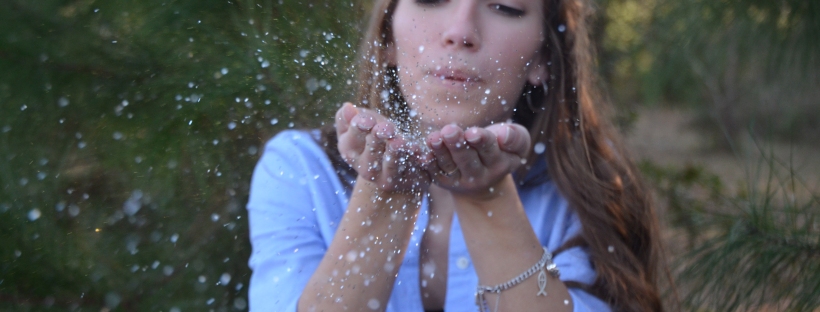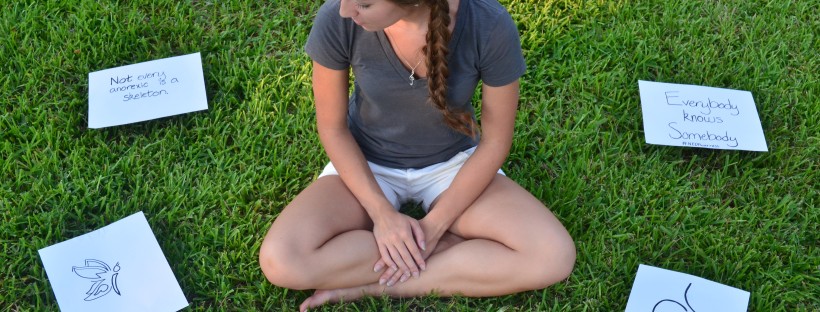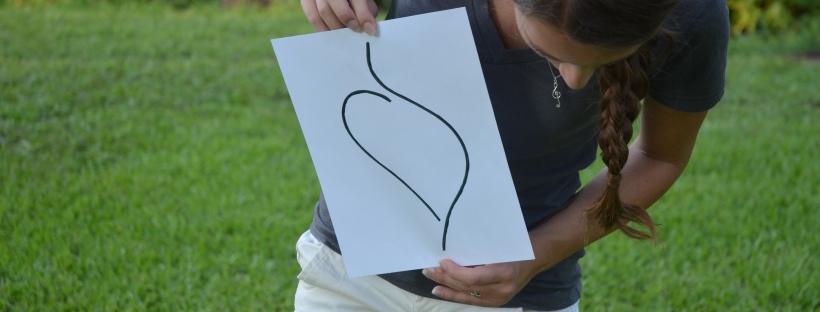NEDA Week 2013— I watched silently as the week went by, still clinging onto an eating disorder as my secret.
NEDA week 2014— I shared my story and started speaking very openly for the first time about my history with an eating disorder.
NEDA week 2015— I said “I made it.”
NEDA week 2016— I’m not so sure that that was the right way to put it.
Last year, I came to the conclusion that I had recovered. I had made it to freedom. I would never have disordered thoughts again. Life would be perfect.
I wanted to believe that I could put it all behind me, and I still do believe that you can do just that to a certain extent. This summer was the freest I’d been in two and a half years. It makes sense that summer was “easier” in a sense, just because there wasn’t the stress of school on me. We went on an amazing road trip, I was soaking up my family and furry boys before leaving for college in the fall, and I was spending lots of time with my mom and aunt shopping and doing DIY things for my dorm room. It was blissful.
I came to college in the fall, and in that transition, I stopped all treatment— no more sessions with my therapist, no more appointments with my dietitian. I have no regrets in making that decision. I went into the fall semester expecting hardship. College is a season of change, and change usually means stress/anxiety in my world. I had to learn how to be my own person, completely manage my own time, learn the ins and outs of college academics, be responsible for myself, and learn how to live in community with lots of different people. It’s a lot all at once, and I had to remain aware of when old thought patterns started to creep back in. I knew all of this coming into the fall semester.
And there were some moments of struggle. There were some moments when sliding backwards was tempting because it seemed easiest. That is, of course, a lie, but it felt that way. Still, the fall semester was overall a fabulous experience. I like to think that I’ve grown since coming to college, and I know I’ve learned more about myself. I had to hold myself accountable to recovery, be completely responsible for my health, and I did it. College has been a great experience not only in learning how to be more independent in life, but also in how to be independent and still responsible with my mental health.
I think I got comfortable coming into the spring semester though. And that comfort combined with instability in several areas of my life created a slippery slope. And I wasn’t proactive. And I slipped. But even through this experience, I’m learning. I’m learning more about myself. I’m learning more about the nature of eating disorders. I’m learning more about the very imperfect process of recovery. I’m learning that it might be a more on-going thing than I thought a year ago. I’m discovering that I might have to remain more aware than I might like of my anxieties and little triggers that can add up to a slippery slope. I’m learning that there’s a fine line between putting the things of the past in the past while still being watchful that they don’t try to find their way back into the present.
I’m also learning about grace. I mean, I didn’t create a blog with the URL Learning to Love Imperfection for no reason. That statement has significance to me. I’m never going to be perfect, and that’s okay. That has to be okay. Striving for perfection will kill a person, emotionally if not physically. So I’m imperfect. And I have made mistakes, and do make mistakes, and will continue making mistakes for the rest of my days on earth. The beautiful thing is that God loves me in my brokenness. And I should too.
I’m also smarter than I was when I first set out on the journey to health and well-being. I have so many tools at my disposal and know how to use them. I know what trips me up and what I need to watch myself for. It’s just a matter of remembering to do it. I just have to remember at some small cognitive-level that as normal as I am, I’m susceptible to disordered eating habits and that’s just a fact of my life now. But it isn’t the defining fact and does not have to rule my life anymore than I let it.
The Lord never fails to have another lesson in mind for me just when I think I’ve got the hang of things. Honestly, I wouldn’t have it any other way. I like the challenge and don’t do well just treading water with no where to go. So I’ll keep swimming as long as the Lord is leading the way. And I’ll keep saying “I made it.” I’ll just redefine that statement:
I don’t see recovery as a place you reach and stay at for the rest of your life, like a final destination kind of thing.
My view has shifted to seeing recovery as more of an on-going process that is always teaching us new things about ourselves, others, and our world. I’m okay with that. I’m okay with being dynamic and always growing and learning and being molded.
Moses led the Israelites around the desert for forty years to die just before they got to take the Promise Land. He never reached the end goal, but I certainly wouldn’t say all of his life was lived in vain. I’m starting to think recovery (heck, life in general) is a lot like that. We’ll wander and wander and we may or may not ever enter the promised land, and that’s okay. Sometimes its not about the end goal, but the journey to get there instead. The wandering is that grey area where living and loving and learning happen. We need the wandering.
So as eating disorder awareness week comes to a close, I’m reflecting on my path thus far and I’m proud. I’m not ashamed or upset about the fact that I developed an eating disorder. It’s led me to so much good, including the relationship that introduced me to the college campus I now call home. I’m thankful for everything I’ve learned about myself and life because of what really is a dreadful disease at the core. I’m thankful for the awareness this week brings to the subject, and for the hope and happy-endings circulated so widely in this time. I’m thankful that I’m not done learning and growing, and I’m thankful that there truly is life after an eating disorder.
To read my story from two years ago: click here
To read my update from last year: click here
For more information and resources on eating disorders, visit NEDA’s website.
Cover Photo Creds: Amberlyn Fagala
And as always, feel free to contact me or drop me a comment with any questions!




